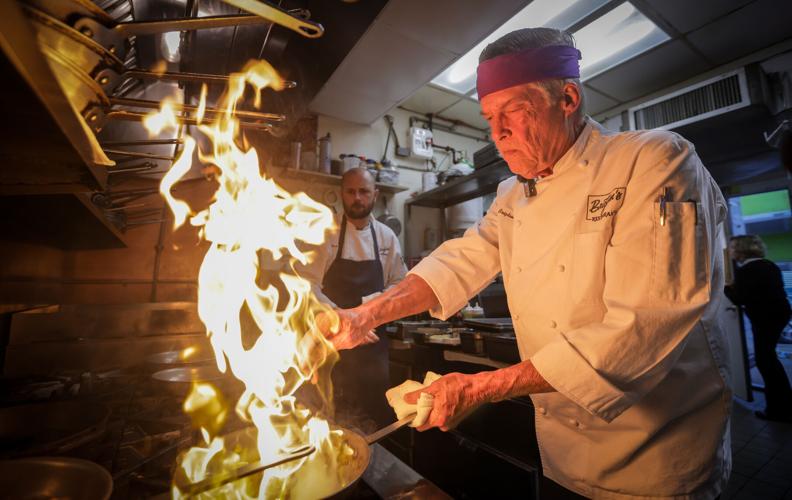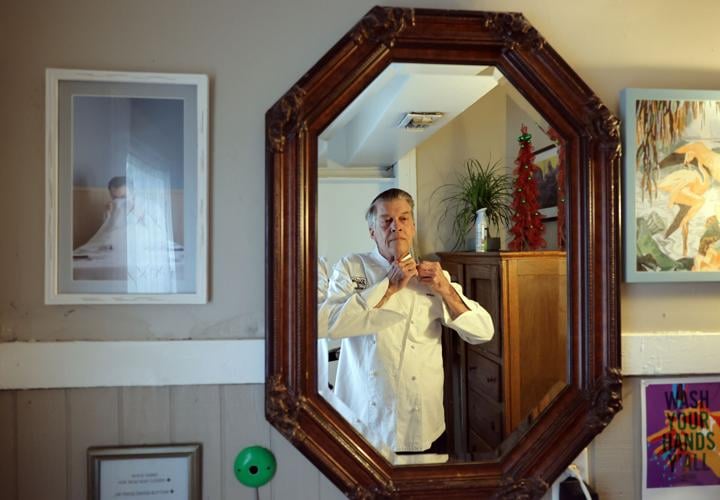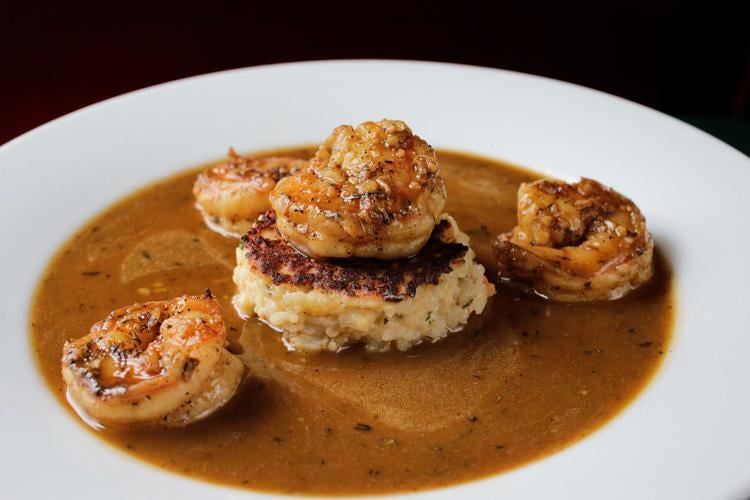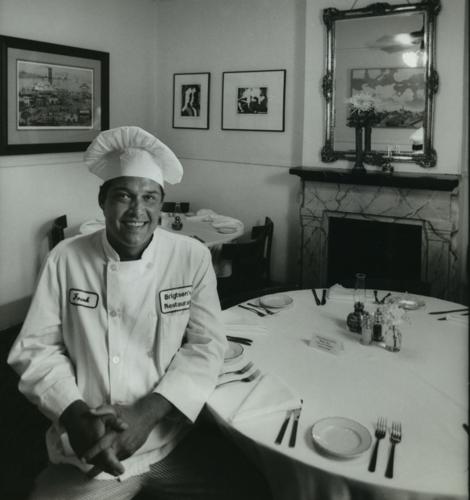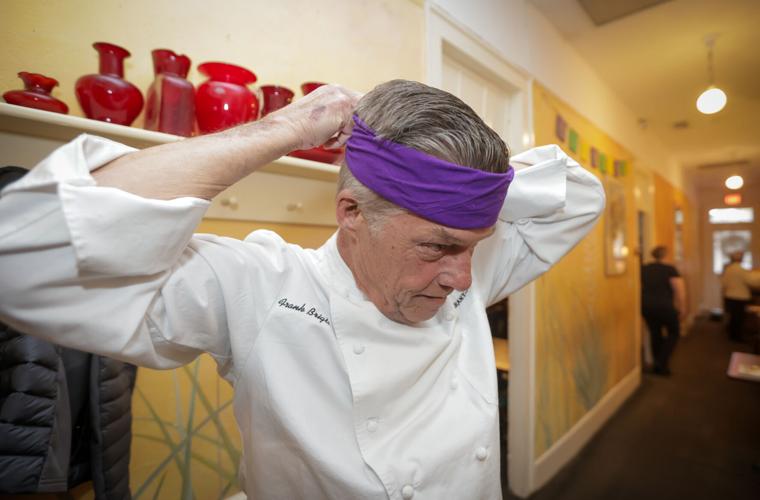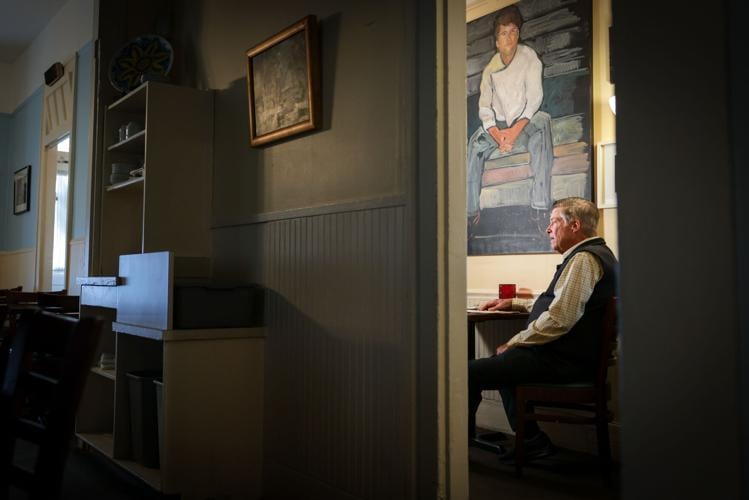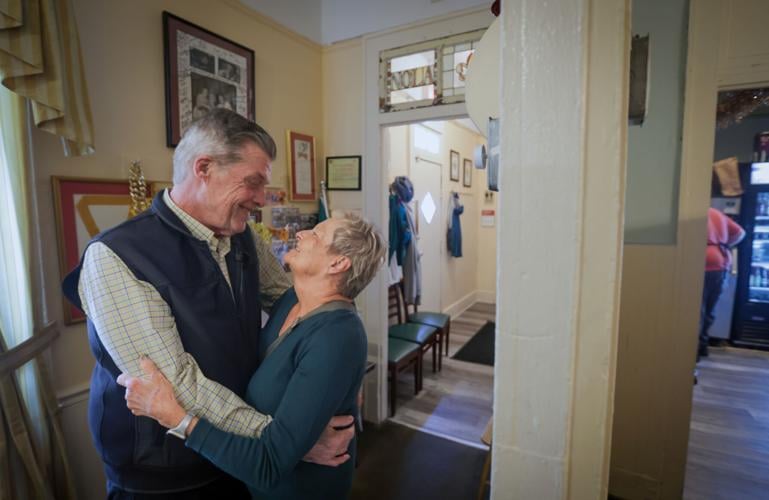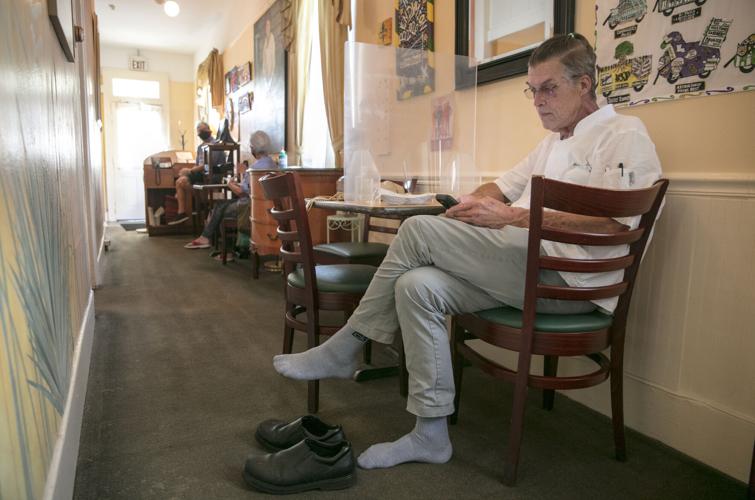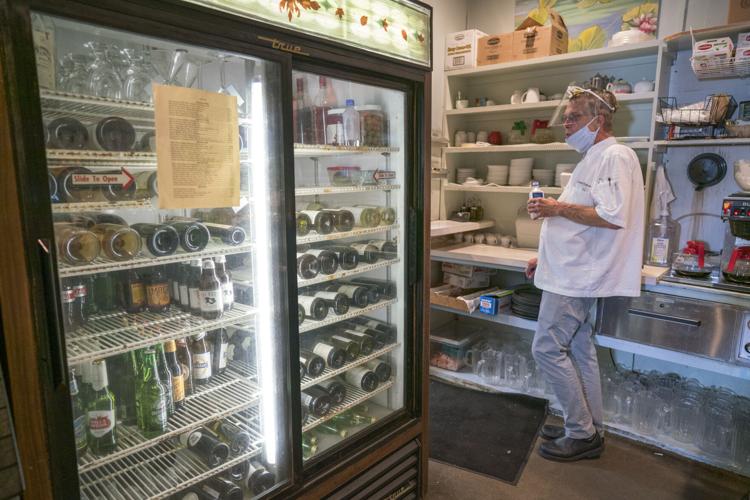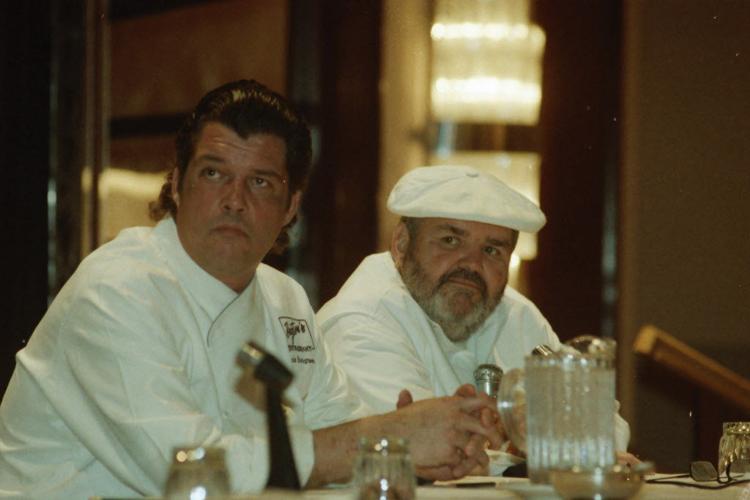This is the fifth story in The Guardians, a 6-part series highlighting those dedicated to saving and passing down New Orleans' unique heritage.
The stove is full of skillets, sizzling or simmering away on their own timelines while chef Frank Brigtsen orchestrates the progress of each dish simultaneously.
He eyeballs the pan with the flounder meuniere, then reaches around to grab another two-finger dollop of butter for the sauce, explaining as he goes.
“We’re building flavor,” he says over the clang of his cramped, busy kitchen in the back of Brigtsen’s Restaurant. “We’re keeping the 'fond...' those browned bits of flour that come loose. You keep that to add flavor. That’s how you get the rich butteriness and toastiness in the sauce."
Brigtsen talks as he gets a tableful of entrees across the finish line, including the meuniere dish, which, by his own estimate, he's prepared “tens of thousands of times.”
He is not talking to himself.
“Whenever he talks, it’s like you hear a tap-tap on the mic,” said Nick Cook, chef de cuisine at Brigtsen’s. “He’s going to say something you’ll want to remember.”
The rest of the kitchen crew was watching too, nodding as the maxims kept coming.
“Fire creates flavor,” Brigtsen said as flames raced in circles around the edge of a pan of barbecue shrimp.
“We’re chasing flavor, that’s what this is about,” the chef said.

Chef Frank Brigtsen prepares for the day at Brigtsen's Restaurant in New Orleans on Nov. 30, 2023.
Brigtsen narrates as he goes because he wants his crew to understand not just what to do, but why they do it.
It is not just the way the bright, assertive shrimp remoulade wakes up the palate at the start of a meal, or how his trout meuniere keeps a crisp edge under the buttery sauce. For the chef, it is the power of these dishes to connect people with New Orleans culture, and thus to each other.
“It’s important to me that each plate, especially the real New Orleans plates — the remoulade, the meuniere, the gumbo — convey the rich history of my culture and what New Orleans means,” he said.
“There’s a context there, there’s a history there. Each plate carries that history forward.”
Connection through food
The veteran chef, now 69, has run his namesake restaurant in the Riverbend with his wife, Marna, since 1986. He’s won national recognition, including a James Beard award in 1998, and built a highly devoted local following. Many doggedly supported the restaurant with takeout orders during the coronavirus pandemic.
It has been a long and storied career in New Orleans cuisine. But Brigtsen’s work today is very much fixed on the future. He is driven to impart to the next generation of chefs the idea of a New Orleans culinary heritage that goes beyond culinary skills.
Brigtsen is a fourth-generation New Orleans native, born Uptown at the hospital now called Ochsner Baptist. His love affair with New Orleans cooking started the old fashioned way, with his family.

Customers dine at Brigtsen's Restaurant in New Orleans on Oct. 16, 2015.
As he sees it, the key to New Orleans culture is how people feel by participating in it, and restaurants provide one of those avenues.
“Our greatest asset is not our food, it’s the people. It’s how we interact with each other and with visitors,” he said. “We want everyone to love New Orleans just like we do. That’s where you get that instant connection with people. Our food is one of those ways we connect like that.”
From protégé to mentor
Brigtsen’s story is forever tied to Paul Prudhomme. The late, great chef hired him for his first serious restaurant job at Commander’s Palace in 1978. Brigtsen followed Prudhomme to his own restaurant, K-Paul’s Louisiana Kitchen, where he became the Cajun master’s protégé. Prudhomme urged him to embark on his own path and even helped bankroll Brigtsen’s Restaurant.

New Orleans chefs Frank Brigtsen, left, and Paul Prudhomme are seen March 26, 1997.
But Brigtsen says his formative years were marked by many other mentors of far less acclaim. These were the cooks and chefs who ran different stations of the kitchen and took time to teach what they knew.
“I realized that this is how Creole culinary heritage has been passed down for generations. Not in culinary schools, but in kitchens,” Brigtsen said. “There is this circle of great Creole chefs who passed it down one person to another, just as it's always been done. I always felt like I was part of this continuum of great Creole cooking in that way.”
The Katrina imperative
That shared culinary heritage seemed most imperiled after Hurricane Katrina, Brigtsen said.
Many New Orleans natives didn’t return. Newcomers moving in from elsewhere arrived with different tastes and ideas.
While Brigtsen appreciated the newfound diversity, he worried about what would happen if the intergenerational exchange he experienced as a young chef was diluted amid the changes.
He had taught cooking classes outside his restaurant before Katrina. But now Brigtsen felt compelled to do more.

Chef Frank Brigtsen prepares for the day at Brigtsen's Restaurant in New Orleans on Nov. 30, 2023.
He threw himself into formal culinary education roles, hoping to reach up-and-coming local talent. He spent 17 years as an instructor in a specially designed culinary course on Creole and Acadian food at Nicholls State University in Thibodaux, and he was the first chef-in-residence at the New Orleans Center for Creative Arts when the high school created its culinary arts program in 2011.
Brigtsen retired from those teaching positions last year, but students who first met him in the classroom keep coming through his restaurant kitchen. They’re building careers and continuing their education in Creole flavor, the Brigtsen way.
One is Cook, who first met his future boss 17 years ago as a student at Nicholls. He said joining Brigtsen’s kitchen last summer felt like a return to school.
“It’s like being in a learning kitchen, and it’s not just how to cook these dishes,” Cook said. “He’s passing on how to run a restaurant, what it takes, the culture you need to keep people engaged.”
Crisis, commitment

Chef Frank Brigtsen takes a break on reopening night at Brigtsen's Restaurant in New Orleans on July 30, 2020, after the coronavirus forced the restaurant into takeout-only business.
The pandemic, onerous for hospitality businesses across the board, presented a particularly difficult challenge for Brigtsen's.
The chef had been sober for 25 years and relapsed in 2020 amid the pressures of trying to keep the restaurant running and his staff and customers safe. He eventually got help, including from the hospitality industry support group Ben’s Friends, and is now approaching two years sober again.
“What I discovered was I wasn’t looking for sobriety, I was looking for happiness,” he said. “Part of happiness to me is productivity, and that’s a lot easier for me being sober.”
It was through this time that the chef and his wife looked closely at retiring.
The couple has no children to take over, and while they had been grooming a long-time staff member to one day buy Brigtsen’s, he left the business during the pandemic.

Chef Frank Brigtsen hugs his wife, Marna, at Brigtsen's Restaurant in New Orleans on Nov. 30, 2023.
“We looked at the possibilities, but just decided to keep going,” Brigtsen said. “Marna and I both recommitted, and really that’s given us a little more bounce in our step since. Now we have a clear path. We’re doing things with purpose again.”
Still, that path has been increasingly difficult as Brigtsen’s contends with the higher food and labor costs that have hit restaurants in recent years.
“The old formula is out the window, so we just keep adjusting,” Brigtsen said. “Break even sounds really good right now, and we’re not there yet.”
'Why it matters'
Valentina Orihuela met Brigtsen as a student at NOCCA. Now, the 18-year-old is a freshman at Loyola University and works three nights a week at his restaurant, where she felt drawn back.
“It’s not only about the fundamentals and technique," Orihuela said. "It’s also about the why — why we’re cooking this way, why it matters.”

Chefs Emeril Lagasse, third from right, and Frank Brigtsen, fifth from right, pose with culinary students of the New Orleans Center for Creative Arts on March 22, 2011.
Take gumbo, for example, a point of pride at Brigtsen’s. In the summer, when fresh okra is available, the chef makes sure his kitchen staff knows why it’s in his gumbo, tying the vegetable’s role on the local table to the Africans bought and sold in the Deep South by slave traders.
“Each time you serve okra gumbo, you’re serving an acknowledgment of those people and what food meant to them,” Brigtsen said.
Brigtsen’s is in an old shotgun house by the Mississippi River levee that gives a homey, familial feel across small dining rooms set with simple mantles and local art.
Marna Brigtsen and her sisters Rhonda Madach and Sandy Hanson all have front-of-the-house roles (“I married three sisters,” the chef jokes about his in-laws’ close relationship). They greet regulars who have been coming here for decades, and some from the start.
It's a restaurant of relationships, and that continues in the kitchen.
“Everybody who’s worked in this kitchen, I think will always remember what happened here,” Brigtsen said. “I’m hoping that after I’m long gone, they’ll still remember what they learned here, what they experienced here, and the joy they gave to the guests here. I want that to be my legacy.”

